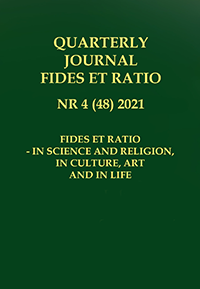Abstract
The purpose of this study was to examine whether levels of self-esteem and perfectionism are related to passive and active work postponement. The study was conducted among 325 young adults (219 females and 106 males). The following tools were used: New Active Procrastination Scale (NAPS), General Procrastination Scale (GPS), Polish Questionnaire of Adaptive and Maladaptive Perfectionism (KPAD), Rosenberg Self-Esteem Scale (SES). The results indicate that active procrastination is negatively related to self-esteem and maladaptive perfectionism, and positively related to adaptive perfectionism. Passive procrastination positively correlates with self-esteem and maladaptive perfectionism, and negatively with adaptive perfectionism. The obtained data deepen the knowledge on the determinants of procrastination, which is worth considering from two perspectives - positive and negative.
References
Babu, P., Chandra, K.M., Vanishree, M.K., & Amritha, N. (2019). Relationship between academic procrastination and self-esteem among dental students in Bengaluru City, Journal of Indian Association of Public Health Dentistry, 17, 146-151.
Brando-Garrido, C., Montes-Hidalgo, J., Limonero, J.T., Gómez-Romero, M.J., & Tomás- Sábado, J. (2020). Relationship of academic procrastination with perceived competence, coping, self-esteem and self-efficacy in nursing students, Enfermería Clínica, 30, 398–403, https://doi.org/10.1016/j.enfcle.2019.07.013.
Chu, A.H.C., & Choi, J.N. (2005). Rethinking procrastination: Positive effects of “active” procrastination behavior on attitudes and performance, The Journal of Social Psychology, 145, 245–264.
Codina, N., Castillo, I., Pestana, J.V., & Balaguer, I. (2020). Preventing procrastination behaviours: teaching styles and competence in university students, Sustainability, 12, 2448, https://doi.org/10.3390/su12062448.
Dike, I, & Emmanuel, S.O. (2019). Study on conscientiousness, academic self-efficacy and self-esteem predictive power on academic procrastination among counselling students, Psychocentrum Review, 192, 69-78, https://doi.org/10.26539/pcr.1281.
Hernández, Y.C.U., Cueto, O.F.A., Shardin-Flores, N., & Luy-Montejo, C.A. (2020). Academic procrastination, self-esteem and self-efficacy in university students: Comparative study in two Peruvian cities, International Journal of Criminology and Sociology, 9, 2474- 2480, https://doi.org/10.6000/1929-4409.2020.09.300.
Jorg, D., Potok, W., & Krajewska, V. (2016). Prokrastynacja a wyuczona zaradność i jej korelaty [Procrastination versus learned resourcefulness and its correlates] W: J. Urbańska, K. Karpe, & N. Żyluk (red.), Zaradność absolwentów szkół wyższych [The resourcefulness of college graduates], 71-84, Poznań: Wydawnictwo Naukowe Wydziału Nauk Społecznych UAM.
Lipińska-Grobelny, A., & Michałowska, W. (2018). Klimat organizacyjny a odkładanie pracy na później [Organizational climate nad procrastination], Organizacja i Kierowanie, 1, 35-48.
Lambird K.H, & Mann T. (2006). When do ego threats lead to self-regulation failure? Negative consequences of defensive high self-esteem, Personality and Social Psychological Bulletin, 32(9), 1177-87, https://doi.org/10.1177/0146167206289408.
Łaguna, M., Lachowicz-Tabaczek, K., & Dzwonkowska, I. (2007). Skala Samooceny SES Morrisa Rosenberga – polska adaptacja metody [Morris Rosenberg SES Self- Assessment Scale–Polish adaptation of the method], Psychologia Społeczna, 2, 164-176. Paszkowska-Rogacz, J. & Poraj, G. (2017). Indywidualne właściwości a tendencja do prokrastynacji u studentów [Individual characteristics versus procrastination tendency in college students], Psychologia Wychowawcza, 54, 108-121.
Sherry, S.B., Stoeber, J., & Ramasubbu, C. (2016). Perfectionism explains variance in self- defeating behaviors beyond self-criticism: Evidence from a cross-national sample, Personality and Individual Differences, 95, 196-199.
Sirois, F.M., Molnar, D.S., & Hirsch, J.K. (2017). A meta-analytic and conceptual update on the associations between procrastination and multidimensional perfectionism, European Journal of Personality, 31, 137-159.
Smith, M.M., Sherry, S.B., Saklofske, D.H., & Mushqaush, A.R. (2017). Clarifying the perfectionism-procrastination relationship using a 7-day, 14-occasion daily diary study, Personality and Individual Differences, 112, 117-123.
Steel, P. (2007). The nature of procrastination: A meta-analytic and theoretical review of quintessential self-regulatory failure, Psychological Bulletin, 133, 65-94.
Svartdal, F., Pfuhl, G., Nordby, K., Foschi, G., Klingsieck, K.B., Rozental, A., Carlbring, P., Lindblom-Ylänne, S., & Rębkowska, K. (2016). On the measurement of procrastination: Comparing two scales in six European countries, Frontiers in Psychology, 7, 130-137.
Szczucka, K. (2010). Polski Kwestionariusz Perfekcjonizmu Adaptacyjnego i Dezadaptacyjnego [Polish Questionnaire of Adaptive and Maladaptive Perfectionism], Psychologia Społeczna, 1, 71-95.
Tibbett, T.P., & Ferrari, J.R. (2015). The portrait of the procrastinator: Risk factors and results of an indecisive personality, Personality and Individual Differences, 82, 175-184, https://doi.org/10.1016/j.paid.2015.03.014.
Wazid, S.W., Ghazi, S., & Gupta, D. (2016). Procrastination among students: The role of gender, perfectionism and self-esteem, The Indian Journal of Social Work, 77, 191-210.
Wróbel M., &Bartosiewicz A. (2011). Wstępna analiza właściwości psychometrycznych narzędzi do pomiaru prokrastynacji aktywnej i pasywnej [Preliminary analysis of the psychometric properties of tools to measure active and passive procrastination], VIII Zjazd Naukowy Polskiego Stowarzyszenia Psychologii Społecznej „Psychologia świata społecznego”, Poznań.
Yang, X., Liu, R.-D., Ding, Y., Hong, W., & Jiang, S. (2021). The relations between academic procrastination and self-esteem in adolescents: A longitudinal study, Current Psychology: A Journal for Diverse Perspectives on Diverse Psychological Issues. Advance online publication, https://doi.org/10.1007/s12144-021-02075-x.

